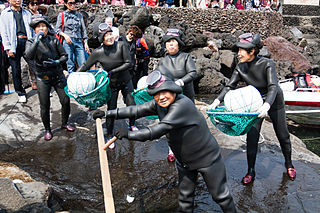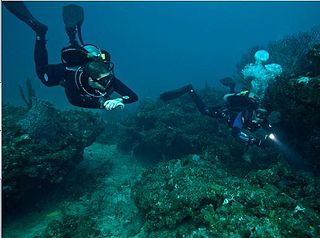Blood shift has at least two separate meanings:
- In medicine, it is synonymous with left shift
- In diving physiology, it is part of the diving reflex
Blood shift has at least two separate meanings:
Scuba may refer to:
Diver or divers may refer to:
Aquatics may refer to:

The diving reflex, also known as the diving response and mammalian diving reflex, is a set of physiological responses to immersion that overrides the basic homeostatic reflexes, and is found in all air-breathing vertebrates studied to date. It optimizes respiration by preferentially distributing oxygen stores to the heart and brain, enabling submersion for an extended time.

Saturation diving is diving for periods long enough to bring all tissues into equilibrium with the partial pressures of the inert components of the breathing gas used. It is a diving mode that reduces the number of decompressions divers working at great depths must undergo by only decompressing divers once at the end of the diving operation, which may last days to weeks, having them remain under pressure for the whole period. A diver breathing pressurized gas accumulates dissolved inert gas used in the breathing mixture to dilute the oxygen to a non-toxic level in the tissues, which can cause decompression sickness if permitted to come out of solution within the body tissues; hence, returning to the surface safely requires lengthy decompression so that the inert gases can be eliminated via the lungs. Once the dissolved gases in a diver's tissues reach the saturation point, however, decompression time does not increase with further exposure, as no more inert gas is accumulated.
Diving most often refers to:

Ama are Japanese divers famous for collecting pearls, though traditionally their main catch is seafood. The vast majority of ama are women.
A baseline is a line that is a base for measurement or for construction.

Underwater habitats are underwater structures in which people can live for extended periods and carry out most of the basic human functions of a 24-hour day, such as working, resting, eating, attending to personal hygiene, and sleeping. In this context, 'habitat' is generally used in a narrow sense to mean the interior and immediate exterior of the structure and its fixtures, but not its surrounding marine environment. Most early underwater habitats lacked regenerative systems for air, water, food, electricity, and other resources. However, some underwater habitats allow for these resources to be delivered using pipes, or generated within the habitat, rather than manually delivered.
Jim or JIM may refer to:

Haenyeo are female divers in the South Korean province of Jeju, whose livelihood consists of harvesting a variety of mollusks, seaweed, and other sea life from the ocean. Known for their independent spirit and determination, haenyeo are representative of the semi-matriarchal family structure of Jeju.

Edward Francis Eldred was a pioneer of scuba diving in Australia. He invented Porpoise scuba gear.
Publius Licinius Crassus may refer to:

Richard Rutkowski is a pioneer in the fields of hyperbaric medicine, diving medicine and diver training, especially in relation to the use of breathing gases.

Captain Trevor Jackson is an Australian technical diver, shipwreck researcher, author and inventor. In 2002 he staged what became known as the "Centaur Dive", which subsequently led to the gazetted position of the sunken Hospital Ship AHS Centaur being questioned. Jackson is the inventor of the 'Sea Tiger' lost diver location system, and an author on the subject of wreck diving.

Bob Halstead, has made significant contributions to the sport of scuba diving in a multitude of capacities: photographer, author of eight diving books, early innovator in the development of dive tourism, pioneer in the dive liveaboard industry, diving instructor and educator, marine-life explorer and influential diving industry commentator. An ardent diver since 1968, Halstead has over 10,000 logged dives.

The trim of a diver is the orientation of the body in the water, determined by posture and the distribution of weight and volume along the body and equipment, as well as by any other forces acting on the diver. Both static trim and its stability affect the convenience and safety of the diver while under water and at the surface. Midwater trim is usually considered at approximately neutral buoyancy for a swimming scuba diver, and neutral buoyancy is necessary for efficient maneuvering at constant depth, but surface trim may be at significant positive buoyancy to keep the head above water.
Dive Bar Tour can refer to
Bass music is a term used to describe several genres of electronic dance music and hip hop music arising from the 1980s on, focusing on a prominent bass drum and/or bassline sound. As one source notes, there are "many different types of bass music to fall into, each putting a different spin on one of music's loudest elements". Typically, the bass sound is created using synthesizers and drum machines such as the influential Roland TR-808.

Joe's Bar and Grill is a dive bar in Seattle's Chinatown–International District, in the U.S. state of Washington.